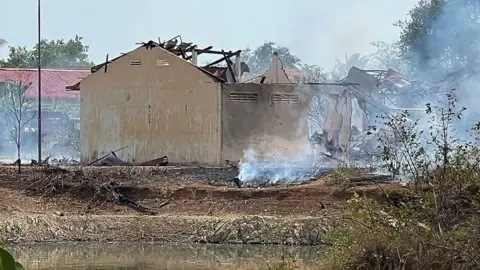Cambodia blames heatwave for deadly ammo blast
Cambodia has blamed factors including the heatwave gripping south-east Asia for a deadly ammunition warehouse explosion.
Twenty soldiers were killed in the incident in Kampong Speu province, Cambodia on Saturday.
Rejecting claims that rebellious soldiers were to blame, officials said the blast was caused by a combination of faulty munitions and extremely hot weather.
Temperatures of up to 43C (109.4F) are forecast for the country.
Climate change worsened Asia heatwave by 2C – study
An office building as well as nearby barracks were destroyed, with 25 nearby homes affected, reports said.
Images of the incident show a destroyed warehouse, a damaged military truck and a child with gashes being treated by medics. Multiple explosions can be heard on unverified social media video.
“The incident of the ammunition explosion on April 27, 2024… was a technical issue because the weapons are old, faulty, and the hot weather,” Cambodia’s defence ministry said in a statement, according to AFP.
Prime Minister Hun Manet has said he was “deeply shocked” by the blast. He said authorities would cover funeral expenses and pay compensation of $20,000 (£16,000) to the families of those killed, while injured soldiers will get $5,000, he said.
 AFP via Getty Images
AFP via Getty ImagesLike large parts of south and south-east Asia, Cambodia has been struggling with hot weather in recent weeks. Temperatures could still hit 43C (109.4F) in the country by the weekend, Crisis24, a risk management company, told the Khmer Times.
In the Philippines, half the country is experiencing a drought, with temperatures reaching highs in several areas.
The heat has forced Bangladesh to suspend classes. The measures have affected 33 million students.
In Thailand, 30 people died of heatstroke between January and 17 April this year, compared with 37 in the whole of 2023, the health ministry said.
Unicef has warned that more than 243 million children across eastern Asia and the Pacific are at risk of heat-related illnesses and death.
One climate expert has attributed the excessive heat to climate change and the impact of a powerful El Niño weather system in the western Pacific.



